初中英语人教版知识点总结
人教版初中英语分册复习知识点归纳总结

人教版初中英语分册复习知识点归纳Unit 1 School lifeLanguage points1.介词in和at的用法区分2.be动词的基本形式、肯定、否定和一般疑问句3.问路和指路的表达4.数词的读法Grammar1.现在进行时的构成及用法2.一般现在时的构成及用法Vocabulary1.学科和课程相关的词汇2.学生活动相关的词汇Unit 2 Leisure timeLanguage points1.一般过去时的构成及肯定、否定、疑问句2.名词性物主代词和形容词性物主代词的用法3.比较级的构成及用法Grammar1.过去进行时的构成及用法Vocabulary1.活动和娱乐相关的词汇Unit 3 TravellingLanguage points1.祈使句的构成及用法2.一般将来时的构成及用法3.一般现在时和一般过去时与时间状语的搭配Grammar1.现在完成时的构成及用法Vocabulary1.旅游和交通相关的词汇Unit 4 Our worldLanguage points1.一般疑问句及特殊疑问词的构成和用法2.句子的基本结构及语序的基本要求和常用变化3.祈使句和陈述句的区别和用法4.句子成分的分类及其基本特点Grammar1.直接引语和间接引语的转换Vocabulary1.环保和地理相关的词汇Unit 5 Festivals and celebrationsLanguage points1.现在完成时和一般过去时的区别及其搭配2.形容词和副词的比较级和最高级的构成及用法3.祈使句和陈述句的区别和用法Grammar1.宾语从句的引导词和语序的要求Vocabulary1.节日庆典相关的词汇以上是人教版初中英语分册的部分课程知识点和语法知识点、词汇,希望同学们能够按照这些知识点进行有策略的学习和,提高英语学习效率。
初中英语人教版八年级知识点详细汇总

初中英语人教版八年级知识点详细汇总一、语法重点1. **时态**-一般现在时:用于描述经常发生的动作或状态。
-现在进行时:表示正在进行的动作。
-一般过去时:描述过去发生的动作或状态。
-过去进行时:表示过去某个时间点正在进行的动作。
2. **代词**-人称代词:主格和宾格的使用。
-物主代词:形容词性物主代词和名词性物主代词。
-反身代词:表示动作反射回到动作执行者身上。
3. **介词**-表示时间的介词:at, on, in。
-表示地点的介词:at, on, in。
-其他常用介词:with, by, for, of, about。
4. **情态动词**- can/could:表示能力或许可。
- may/might:表示可能性或许可。
- must:表示必须或强烈推测。
- should/ought to:表示建议或义务。
5. **句型结构**-一般疑问句:使用助动词do/does或be/am/is/are构成。
-特殊疑问句:使用疑问词who, what, where, when, why, how等。
-否定句:使用助动词do/does或be/am/is/are后跟not。
二、词汇与短语1. **基础词汇**-常见名词:school, teacher, student, family, friend等。
-常见动词:go, come, have, make, play等。
-常见形容词:big, small, happy, sad, easy, difficult等。
2. **短语**-动词短语:want to do, have to do, start to do等。
-介词短语:in the morning, on the weekend, at the moment等。
-固定搭配:take care of, look forward to, be good at等。
3. **单元重点短语**(以Unit1为例)- go on vacation 去度假- stay at home 呆在家- go to the mountains 上山/进山- go to the beach 到海边去- visit museums 参观博物馆- quite a few 相当多- taste good 尝起来味道好- have a good time 玩的开心- feel like 感觉像……/想要- go shopping 去购物- walk around 绕……走- buy sth for ab./ buy sb. sth 为某人买某物以上即为初中英语人教版八年级知识点的详细汇总,希望对你的学习有所帮助。
初中英语时态知识点总结人教版
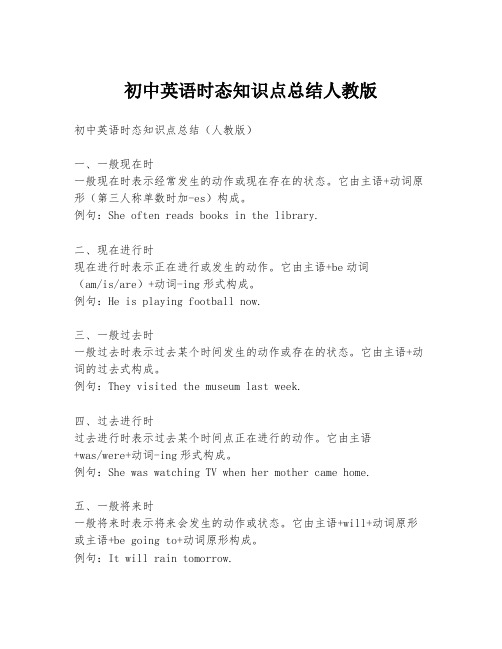
初中英语时态知识点总结人教版初中英语时态知识点总结(人教版)一、一般现在时一般现在时表示经常发生的动作或现在存在的状态。
它由主语+动词原形(第三人称单数时加-es)构成。
例句:She often reads books in the library.二、现在进行时现在进行时表示正在进行或发生的动作。
它由主语+be动词(am/is/are)+动词-ing形式构成。
例句:He is playing football now.三、一般过去时一般过去时表示过去某个时间发生的动作或存在的状态。
它由主语+动词的过去式构成。
例句:They visited the museum last week.四、过去进行时过去进行时表示过去某个时间点正在进行的动作。
它由主语+was/were+动词-ing形式构成。
例句:She was watching TV when her mother came home.五、一般将来时一般将来时表示将来会发生的动作或状态。
它由主语+will+动词原形或主语+be going to+动词原形构成。
例句:It will rain tomorrow.六、将来进行时将来进行时表示将来某个时间点正在进行的动作。
它由主语+will be+动词-ing形式构成。
例句:He will be working at this time tomorrow.七、现在完成时现在完成时表示过去发生的动作对现在造成的影响或结果,或者是从过去开始一直持续到现在的动作。
它由主语+have/has+动词的过去分词构成。
例句:I have finished my homework.八、现在完成进行时现在完成进行时表示从过去某一时间开始,一直持续到现在并可能继续下去的动作。
它由主语+have/has been+动词-ing形式构成。
例句:She has been studying English for five years.九、过去完成时过去完成时表示在过去某个时间点之前已经完成的动作。
英语人教版|九年级全册各单元必考知识点

英语人教版|九年级全册各单元必考知识点-CAL-FENGHAI.-(YICAI)-Company One1初中英语人教版九年级全一册必考知识点Unit1【短语】1. have conversation with sb. 同某人谈话2. too…to… 太……而不能3. the secret to… ……的秘诀4. be afraid of doing sth./ be afraid to do sth. 害怕做某事5. look up 查阅6. repeat out loud 大声跟读7. make mistakes in 在……方面犯错误8. connect ……with… 把……和……连接/联系起来9. get bored 感到厌烦10. be stressed out 焦虑不安的11. pay attention to 注意;关注12. depend on 取决于;依靠13. the ability to do sth.. 做某事的能力【考点】1. by + doing 通过……方式(by是介词,后面要跟动名词,也就是动词的ing形式)2. talk about 谈论,议论,讨论The students often talk about movie after class. 学生们常常在课后讨论电影。
talk to sb= talk with sb 与某人说话3. 提建议的句子:①What/ how about +doing sth. 做…怎么样(about后面要用动词的ing形式,这一点考试考的比较多)如:What/ How about going shopping?②Why don't you + do sth. 你为什么不做…如:Why don't you go shopping?③Why not + do sth. 为什么不做…如:Why not go shopping?④Let's + do sth. 让我们做…...吧。
人教版初中英语九年级全册各单元知识点、语法归纳整理
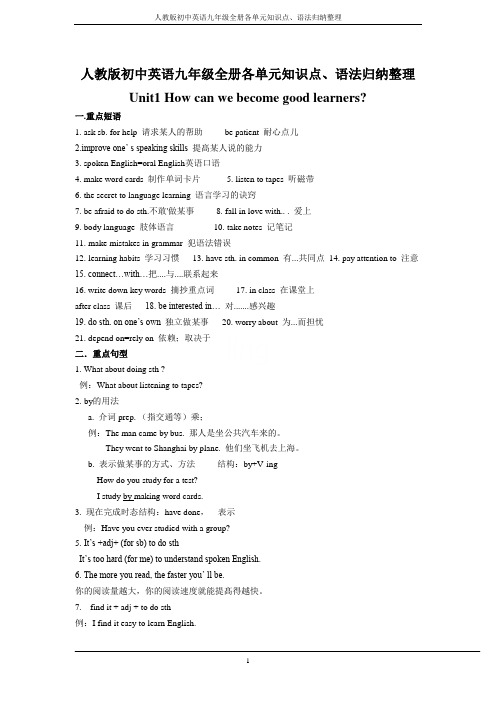
人教版初中英语九年级全册各单元知识点、语法归纳整理Unit1 How can we become good learners?一.重点短语1. ask sb. for help 请求某人的帮助be patient 耐心点儿2.improve one’ s speaking skills 提髙某人说的能力3. spoken English=oral English英语口语4. make word cards 制作单词卡片5. listen to tapes 听磁带6. the secret to language learning 语言学习的诀窍7. be afraid to do sth.不敢'做某事8. fall in love with.. . 爱上9. body language 肢体语言10. take notes 记笔记11.make mistakes in grammar 犯语法错误12.learning habits 学习习惯13. have sth. in common 有...共同点14. pay attention to 注意15. connect…with…把....与....联系起来16. write down key words 摘抄重点词17. in class 在课堂上after class 课后18. be interested in… 对.......感兴趣19. do sth. on one’s own 独立做某事20. worry about 为...而担忧21. depend on=rely on 依赖;取决于二.重点句型1. What about doing sth ?例:What about listening to tapes?2.by的用法a. 介词 prep. (指交通等)乘;例:The man came by bus. 那人是坐公共汽车来的。
完整版人教版初中英语语法完整总结

完整版人教版初中英语语法完整总结人教版初中英语语法完整总结如下:时态:动词的时态分为一般现在时、一般过去时、一般将来时、现在进行时、过去进行时、现在完成时、过去完成时。
一般现在时(Simple Present Tense):表示经常性活动、习惯或客观事实。
一般过去时(Simple Past Tense):表示过去发生的动作或状态。
一般将来时(Simple Future Tense):表示将来发生的动作或状态。
现在进行时(Present Continuous Tense):表示现在正在进行的动作。
过去进行时(Past Continuous Tense):表示过去某个时间点正在进行的动作。
现在完成时(Present Perfect Tense):表示过去发生的动作对现在造成的影响或一直持续到现在的动作。
过去完成时(Past Perfect Tense):表示过去某个时间点或动作之前已经发生过的动作或状态。
语态:英语中的语态分为主动语态和被动语态。
主动语态(Active Voice):主语为动作的执行者。
被动语态(Passive Voice):主语是动作的承受者。
名词:名词主要负责表示事物的名称和概念。
可数名词(Countable Nouns):表示可以计数的名词,可有单数和复数形式。
不可数名词(Uncountable Nouns):表示不可数的名词,只有单数形式。
复数名词(Plural Nouns):表示复数的名词,可通过在名词后加-s或-es形成。
冠词:冠词主要用于限定名词。
不定冠词(Indefinite Article):a/an,表示泛指。
定冠词(Definite Article):the,表示特指。
形容词:形容词用于修饰名词,表示事物的性质、特征或状态。
比较级与最高级:形容词有比较级和最高级形式,用于比较两个或多个事物的程度。
比较级(Comparative):表示两者之间的比较。
最高级(Superlative):表示三者或以上之间的比较。
(完整版)人教版初中英语知识点汇总
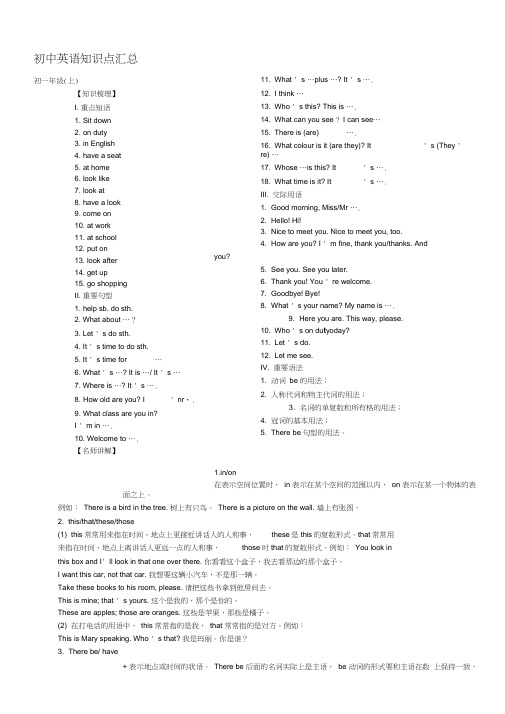
11. What ' s …plus …? It ' s …. 12. I think …13. Who ' s this? This is …. 14. What can you see ? I can see … 15. There is (are)….16. What colour is it (are they)? It ' s (They 're) …17. Whose …is this? It ' s …. 18. What time is it? It ' s ….III. 交际用语1. Good morning, Miss/Mr ….2. Hello! Hi!3. Nice to meet you. Nice to meet you, too.4. How are you? I ' m fine, thank you/thanks. And you?5. See you. See you later.6. Thank you! You ' re welcome.7. Goodbye! Bye!8. What ' s your name? My name is ….9. Here you are. This way, please.10. Who ' s on du t yoday? 11. Let ' s do. 12. Let me see. IV. 重要语法 1. 动词 be 的用法;2. 人称代词和物主代词的用法;3. 名词的单复数和所有格的用法;4. 冠词的基本用法;5. There be 句型的用法。
1.in/on在表示空间位置时, in 表示在某个空间的范围以内, on 表示在某一个物体的表面之上。
例如: There is a bird in the tree. 树上有只鸟。
人教版初中英语知识点
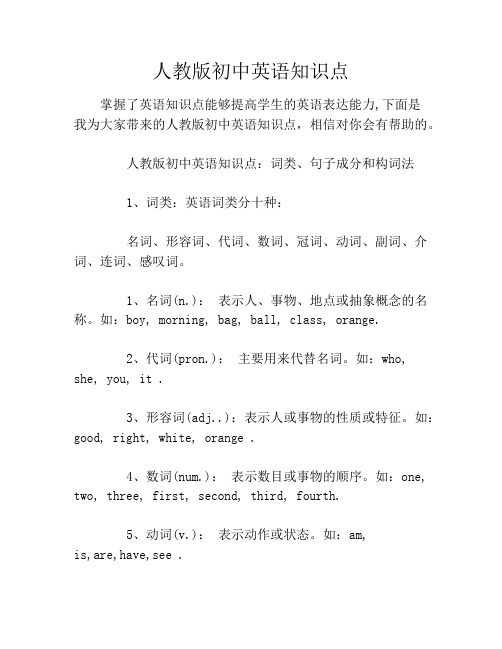
人教版初中英语知识点掌握了英语知识点能够提高学生的英语表达能力,下面是我为大家带来的人教版初中英语知识点,相信对你会有帮助的。
人教版初中英语知识点:词类、句子成分和构词法1、词类:英语词类分十种:名词、形容词、代词、数词、冠词、动词、副词、介词、连词、感叹词。
1、名词(n.):表示人、事物、地点或抽象概念的名称。
如:boy, morning, bag, ball, class, orange.2、代词(pron.):主要用来代替名词。
如:who, she, you, it .3、形容词(adj..):表示人或事物的性质或特征。
如:good, right, white, orange .4、数词(num.):表示数目或事物的顺序。
如:one, two, three, first, second, third, fourth.5、动词(v.):表示动作或状态。
如:am,is,are,have,see .6、副词(adv.):修饰动词、形容词或其他副词,说明时间、地点、程度等。
如:now, very, here, often, quietly, slowly.7、冠词(art..):用在名词前,帮助说明名词。
如:a, an, the.8、介词(prep.):表示它后面的名词或代词与其他句子成分的关系。
如in, on, from, above, behind.9、连词(conj.):用来连接词、短语或句子。
如and, but, before .10、感叹词(interj..)表示喜、怒、哀、乐等感情。
如:oh, well, hi, hello.2、句子成分:英语句子成分分为七种:主语、谓语、宾语、定语、状语、表语、宾语补足语。
1、主语是句子所要说的人或事物,回答是“谁”或者“什么”。
通常用名词或代词担任。
如:I’m MissGreen.(我是格林小姐)2、谓语动词说明主语的动作或状态,回答“做(什么)”。
新人教版初中英语七至九年级课本词汇总结
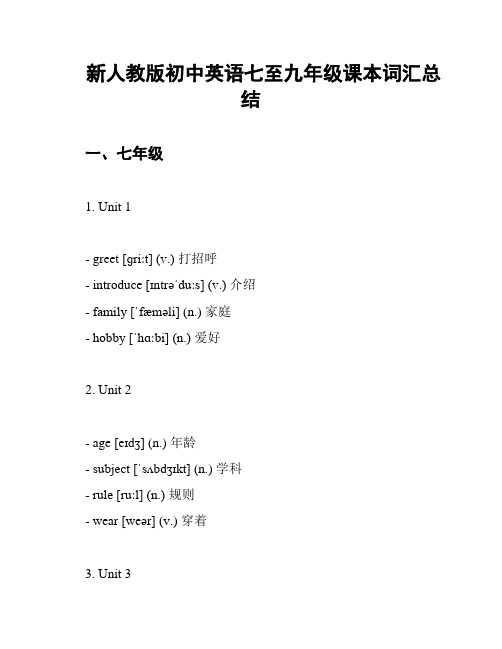
新人教版初中英语七至九年级课本词汇总结一、七年级1. Unit 1- greet [ɡriːt] (v.) 打招呼- introduce [ɪntrəˈduːs] (v.) 介绍- family [ˈfæməli] (n.) 家庭- hobby [ˈhɑːbi] (n.) 爱好2. Unit 2- age [eɪdʒ] (n.) 年龄- subject [ˈsʌbdʒɪkt] (n.) 学科- rule [ruːl] (n.) 规则- wear [weər] (v.) 穿着3. Unit 3- national [ˈnæʃənl] (adj.) 国家的- flag [flæɡ] (n.) 旗帜- population [ˌpɑːpjəˈleɪʃn] (n.) 人口- capital [ˈkæpɪtl] (n.) 首都4. Unit 4- weather [ˈweðər] (n.) 天气- sunny [ˈsʌni] (adj.) 晴朗的- cloudy [ˈklaʊdi] (adj.) 多云的- raining [ˈreɪnɪŋ] (adj.) 下雨的5. Unit 5- music [ˈmjuːzɪk] (n.) 音乐- dance [dæns] (v.) 跳舞- draw [drɔː] (v.) 画画- play [pleɪ] (v.) 玩二、八年级1. Unit 1- exam [ɪɡˈzæm] (n.) 考试- grade [ɡreɪd] (n.) 年级- science [ˈsaɪəns] (n.) 科学- experiment [ɪkˈsperɪmənt] (n.) 实验2. Unit 2- fe stival [ˈfestəvl] (n.) 节日- celebrate [ˈselɪbreɪt] (v.) 庆祝- traditional [trəˈdɪʃənl] (adj.) 传统的- activity [ækˈtɪvəti] (n.) 活动3. Unit 3- history [ˈhɪstəri] (n.) 历史- museum [mjuːˈziːəm] (n.) 博物馆- monument [ˈmɑːnjəmənt] (n.) 纪念碑- ancient [ˈeɪnʃənt] (adj.) 古代的4. Unit 4- job [dʒɑːb] (n.) 工作- engineer [ˌendʒɪˈnɪr] (n.) 工程师- musician [mjuˈzɪʃn] (n.) 音乐家- artist [ˈɑːrtɪst] (n.) 艺术家5. Unit 5- city [ˈsɪti] (n.) 城市- downtown [ˈdaʊntaʊn] (n.) 市区- traffic [ˈtræfɪk] (n.) 交通- subway [ˈsʌbweɪ] (n.) 地铁三、九年级1. Unit 1- environment [ɪnˈvaɪrənmənt] (n.) 环境- pollution [pəˈluːʃn] (n.) 污染- recycle [riːˈsaɪkl] (v.) 回收利用- reduce [rɪˈdjuːs] (v.) 减少2. Unit 2- technology [tekˈnɒlədʒi] (n.) 科技- invention [ɪnˈvenʃn] (n.) 发明- internet [ˈɪntərnɪt] (n.) 互联网- device [dɪˈvaɪs] (n.) 设备3. Unit 3- culture [ˈkʌltʃər] (n.) 文化- tradition [trəˈdɪʃn] (n.) 传统- custom [ˈkʌstəm] (n.) 风俗- festival [ˈfestəvl] (n.) 节日4. Unit 4- government [ˈɡʌvənmənt] (n.) 政府- democracy [dɪˈmɒkrəsi] (n.) 民主- citizen [ˈsɪtɪzn] (n.) 公民- election [ɪˈlekʃn] (n.) 选举5. Unit 5- health [helθ] (n.) 健康- exercise [ˈeksərsaɪz] (n.) 锻炼- diet [daɪət] (n.) 饮食- yoga [ˈjoʊɡə] (n.) 瑜伽以上为新人教版初中英语七至九年级课本的词汇总结。
初中英语知识点总结归纳(人教版)
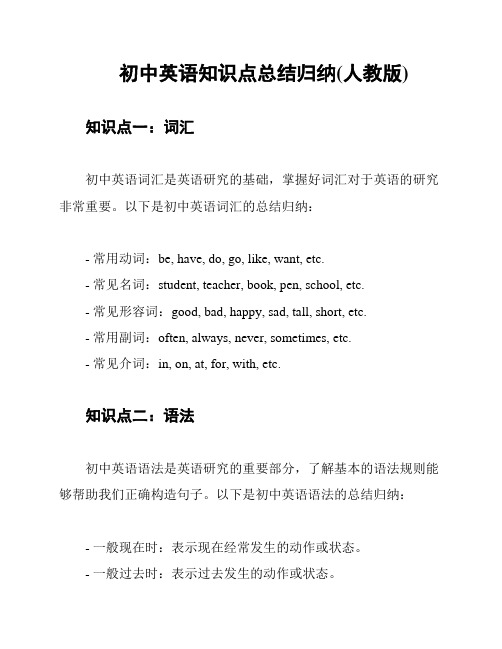
初中英语知识点总结归纳(人教版)知识点一:词汇初中英语词汇是英语研究的基础,掌握好词汇对于英语的研究非常重要。
以下是初中英语词汇的总结归纳:- 常用动词:be, have, do, go, like, want, etc.- 常见名词:student, teacher, book, pen, school, etc.- 常见形容词:good, bad, happy, sad, tall, short, etc.- 常用副词:often, always, never, sometimes, etc.- 常见介词:in, on, at, for, with, etc.知识点二:语法初中英语语法是英语研究的重要部分,了解基本的语法规则能够帮助我们正确构造句子。
以下是初中英语语法的总结归纳:- 一般现在时:表示现在经常发生的动作或状态。
- 一般过去时:表示过去发生的动作或状态。
- 一般将来时:表示将来将要发生的动作或状态。
- 现在进行时:表示现在正在进行的动作。
- 过去进行时:表示过去某个时间段正在进行的动作。
知识点三:阅读理解初中英语阅读理解是培养阅读能力和理解能力的重要方式。
以下是初中英语阅读理解的总结归纳:- 阅读短文时,要注意关键词和上下文的逻辑关系。
- 同义词与反义词的理解。
- 根据文章的语境推断词语的含义。
- 根据问题,寻找文章中的相关信息。
知识点四:写作技巧初中英语写作技巧对于提高英语表达能力非常重要。
以下是初中英语写作技巧的总结归纳:- 写作时要注意语法和拼写的准确性。
- 选择恰当的词汇和句子结构。
- 使用连词和过渡词使文段衔接自然。
- 多读英语文章,研究优秀的写作范例。
以上是初中英语知识点的总结归纳,希望对你的学习有所帮助!。
人教版初中英语知识点汇总
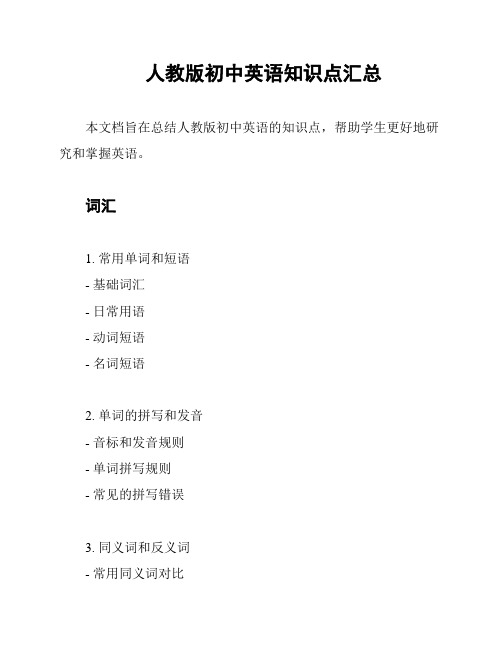
人教版初中英语知识点汇总
本文档旨在总结人教版初中英语的知识点,帮助学生更好地研究和掌握英语。
词汇
1. 常用单词和短语
- 基础词汇
- 日常用语
- 动词短语
- 名词短语
2. 单词的拼写和发音
- 音标和发音规则
- 单词拼写规则
- 常见的拼写错误
3. 同义词和反义词
- 常用同义词对比
- 常用反义词对比
语法
1. 时态
- 一般现在时
- 现在进行时
- 一般过去时
- 过去进行时
- 现在完成时
- 过去完成时
2. 句型和结构
- 肯定句、否定句和疑问句- 直接引语和间接引语
- 倒装句
- 并列句和复合句
- 条件句和虚拟语气
3. 从句和连词
- 定义从句
- 时间状语从句- 原因状语从句- 结果状语从句- 目的状语从句- 条件状语从句
阅读理解
1. 阅读技巧
- 快速阅读
- 扫读和细读- 标记和摘记
2. 阅读题型
- 判断题
- 选择题
- 填空题
- 完形填空
3. 阅读理解策略
- 了解题目要求
- 理解关键词
- 掌握文章结构
- 提炼核心信息
以上是人教版初中英语知识点的汇总,希望本文档能对学生的研究有所帮助。
人教版初中英语知识点总结

人教版初中英语知识点总结英语是一门活的语言,光在课堂上听教师讲授是远远不够的,这就要靠我们透过多种管道学习。
下面是小编为大家整理的人教版初中英语知识点,欢迎大家阅读学习!连词及其用法1.连词是一种虚词,它不能独立担任句子成分而只起连接词与词,短语与短语以及句与句的作用。
2.常见的连词and(和,与;而且;于是,然后;因此)but(但是;通常用not...but...不是...而是...;可是,然而;表示惊讶,不同意等--喔,哇;用来加强语句重复部分的语气--一定;用来引入新话题--那就;常用于否定句--而不,若不;用于含doubt,question等字的否定句中相当于that--对于)or(或者,还是;用于否定句或问句--也不;否则,要不然;也就是说,换言之)nor(用在neither之后--也不;用在no,not,never之后--也不;用在句首,句子需倒装--也不)so(因此,所以;因而,从而)yet(可是,却,然而)for(因为,由于)both…and(既...又...;不但...而且)not only…but also(不但,而且)either…or(不是...就是;要么...要么)neither…nor(既不...也不...)3.并列连词:①and 与or;②both …and两者都;③not only…but ...as well as=not only...butalso不但…而且;④neither…nor意思为"既不……也不……"谓语动词采用就近原则,与nor后的词保持一致。
4.转折或对比连词①but表示转折,while表示对比。
②not…but…意思为"不是……而是……"。
宾语从句1.宾语从句,是名词性从句的一种。
在主从复合句中充当宾语,位于及物动词、介词或复合谓语之后的从句称为宾语从句。
宾语从句分为三类:动词的宾语从句,介词的宾语从句和形容词的宾语从句。
人教版初中英语九年级全册语法知识点

⑥当wh-和how引导的宾语从句与that引导的宾语从句作并列宾语从句时。
感叹句
感叹句是用来表示惊奇、愤怒、赞赏、喜悦等强烈感情的句子。句末常用感叹号“!”,一般读降调。感叹句主要用what和how引起。
1)what引导的感叹句
what引导感叹句的结构为:
Unit 2 I think that mooncakes are delicious!
Objectiveclause withthat, ifandwhether宾语从句
Exclamatory statement感叹句how & what
宾语从句
在句中起宾语作用的从句叫做宾语从句,可以分为三类:动词的宾语从句、介词的宾语从句和形容词的宾语从句。
2.不及物动词+介词(其后需加宾语)
look for寻找care for喜欢,关心get over克服
3.及物动词+副词(其后需加宾语)
send up发射,发送think over仔细考虑try on试穿
如果宾语是人称代词应将其放在动词和副词之间;如果是名词,则既可以放在动词和副词之间,也可以放在副词之后。
⑤当宾语从句是双宾语中的直接宾语或有it作形式宾语时。
⑥当wh-和how引导的宾语从句与that引导的宾语从句作并列宾语从句时。
Unit 4 I used to be afraid of the dark
Usedto过去常常
◉动词词组——Used to do sth(习惯于做某事)
Unit 5 What are the shirtsmade of?
3.介词的宾语从句
(1)一般情况下介词后面只能接wh-类连接词引导的宾语从句。
(完整版)人教版初中英语各单元语法知识点汇总表,推荐文档

(完整版)人教版初中英语各单元语法知识点汇总表,推荐文档初中语法知识点Unit 1 My name’s Gina●一般现在时to be●what question 特殊疑问句●yes/no 一般疑问句与回答●物主形容词possessive adj. my, your, his, herUnit 2 This is my sister ●指示代词 demonstrative pronouns –this, these, that, those ●who question●人称代词 subject pronouns –I, he, she, they ●名词复数 plural nounsUnit 3 Is this your pencil?●Possessive pronouns 物主代词mine, yours, his, hers ●yes/no 一般疑问句与回答Unit 4 Where’s my schoolbag?●Where q uestion●Prepositions 介词on, in, under ●Conjunction 连词 andUnit 5 Do you have a soccer ball?●Present tense 一般现在时to have ●Adj. of quality 质量的形容词●Conj. 连词but●Affirmative & negative statements 肯定&否定句Unit 6 Do you like bananas?●Present tense 一般现在时 to have●Countable/uncountable nouns 可数&不可数名词●Affirmative & negative statements 肯定&否定句Unit 7 How much are these socks?●How much 疑问句Unit 8 When is your birthday?●When 疑问句●Possessive 所有格‘sGrade 7上Unit 9 My favorite subject is science ●What, why, when, who 疑问句Unit 1 Can you play the guitar?●Modal verb 情态动词can ●what 疑问句Unit 2 What time do you go to school?●What time 疑问句●When 疑问句●Adverbs of frequency 频率副词 always, often, usually,never 等Grade 7下Unit 3 How do you get to school?●How, how long, how far 疑问句建议收藏下载本文,以便随时学习!我去人也就有人!为UR扼腕入站内信不存在向你偶同意调剖沙龙课反倒是龙卷风前一天Unit 4 Don’t eat in class ●Imperatives 祈使句Don’t●Can for permission 允许●modal verb 情态动词have to, mustUnit 5 Why do you like pandas?●Why, what, where疑问句where are koalas from?●Because…●Adj. of quality 质量的形容词Unit 6 I’m watching TV ●Present progressive tense 现在进行时●What 疑问句what are you doing?Unit 7 It’s raining!●Present progressive tense 现在进行时●How提问how is it going? How is the weather?●What 提问what are they doing?Unit 8 is there a post office over here?●There be结构●Where疑问句●方位介词prepositions of place:in front of, on your left…Unit 9 What does he look like?●What疑问句what does he look like?●Adjectives of description 描述外表形容词straight, tall,thin, heavy, round, handsome等●Alternative questions 选择疑问句is he tall or short?Unit 10 I’d like some noodles ●Would like●What 疑问句what size would you like?●Some/anyUnit 11 How was your school trip?●Simple past tense 一般过去时●How疑问句How was your school trip?●Adj. of description 描述性形容词excellent, interesting,terrible等Unit 12 What did you do last weekend?●Simple past tense 一般过去时●What疑问句What did you play with?●How疑问句how was your weekend?Unit 1 Where did you go on vacation?●Indefinite pronouns 不定代词●Simple past tense of regular & irregular verbs 及物&不及物动词一般过去时Grade 8上Unit 2 How often do you exercise?●How often…?疑问句●Adv. of frequency 频率副词sometimes, usually, often,建议收藏下载本文,以便随时学习!我去人也就有人!为UR扼腕入站内信不存在向你偶同意调剖沙龙课反倒是龙卷风前一天never, once a monthUnit 3 I’m more outgoing than my sister.●比较级Comparatives with –(i)er & more ●both & as…as…Unit 4 What’s the best movie theater?●最高级Superlatives with – (i)est & the most●不规则变化:good-better-best; bad-worse-worstUnit 5 Do you want to watch a game show?●Infinitives usedas objects 不定式to doUnit 6 I’m going to study computer science ●一般将来时Future with be going to ●want to beUnit 7 Will people have robots?●一般将来时Future with will ●want to beUnit 8 How do you make a banana milk shake?●Imperatives 祈使句●How much/how many疑问句●Countable/uncountable nouns●Adverbs of sequence: first, nest, then, finallyUnit 9 Can you come to my party?●Can for invitations●情态动词Modal verb mightUnit 10 If you go to the party, you’ll have a great time!●First conditional 第一/真实条件句if + will ●情态动词Modal verb shouldUnit 1 What’s the matter?●Modal verbs should/shouldn’t for suggestions●Reflexive pronouns 反身代词myself, yourself,themselves, yourselvesUnit 2 I’ll help to clean up the city parks ●Infinitives as object, adverbial and object complement 不定式宾语,状语和宾语不足语●Modal verb could for suggestions●Phrasal verbs 动词短语Unit 3 Could you please clean your room?●Could for polite requests ●Could for permissionUnit 4 Why don’t you talk to your parents?●Why don’t you…?●Conjunctions until, so that and althoughGrade 8下Unit 5 What were you doing when the rainstorm came?●Conj unctions when and while●Questions and statements with the past progressive tense过去进行时建议收藏下载本文,以便随时学习!我去人也就有人!为UR扼腕入站内信不存在向你偶同意调剖沙龙课反倒是龙卷风前一天Unit 6 An old man tried to move the mountains●Conjunctions unless, as soon as and so…that Unit 7 What’s the highest mountain in the world?●Large numbers●Comparatives and superlatives with adj. & adv. 比较急,最高级Unit 8 Have you read Treasure Island yet?●Present perfect tense with already & yetUnit 9 Have you ever been to a museum?●Present perfect tense with been, ever & neverUnit 10 I’ve had this bike for 3 years●Present perfect tense with since & forUnit 1 How can we become good learners?●Verb + by with gerund 动词+by doing sth. 动名词,通过…Unit 2 I think that mooncakes are delicious!●Objective clause with that, if and whether宾语从句●Exclamatory statement 感叹句how & whatUnit 3 Could you please tell me where the restroomsare?●Objective clauses with wh- questions wh-引导宾语从句Unit4 I used to be afraid of the dark●Used to 过去常常Unit 5 What are the shirts made of?●Passive voice (presenttense) 被动语态一般现在时Unit 6 When was it invented?●Passive voice (past tense) 被动语态一般过去时Unit 7 Teenagers should be allowed to choose theirown clothes●Should + be allowed to do sth.Unit 8 It must belong to Carla●Must, might, could & can’t making inferences做推断Unit 9 I like music that I can dance to●Relative clauses with that, who and which关系从句Unit 10 You’re supposed to shake hands ●Supposed to + infinitive 不定式●Expected to + infinitive 不定式●It is + adj. + infinitiveUnit 11 Sad movies make me cry ●Make + sb. + infinitive without to ●Make + sb. + adj.Unit 12 Life is full of the unexpected●Past perfect tense 过去完成式Unit 13 We’re trying to save the earth!●ReviewGrade 9Unit 14 I remember meeting all of you in Grade 7●Review建议收藏下载本文,以便随时学习!。
人教版(超详)初中英语知识点归纳汇总

初中英语知识归纳总结(打印版)第一课时名词一、概述1、名词的属性:表示人或事物的名称抽象概念的词叫名词。
2、名词分普通名词和专有名词。
普通名词是表示某一类人或事物,或某种物体或抽象概念的名称。
如:teacher, desks, plates, milk, box等,专有名词表示某一特定的人、事物、地方团体、党派、国家机关、语言、节日等专用的名称。
(运用)如:China, Chinese, Saturday, June, Green, Beijing, Olympic等。
(专有名词的第一个字母要大写)二、可数名词与不可数名词1、可数名词是指表示人或事物,可以用数来计量的名词,有单复数之分。
如:glass-----glasses; book---- books2、不可数名词是指所表示的事物不能用数来计量。
如:paper, rice, water , milk, tea等。
3、有些名词在特定情况下由不可数变为可数名词。
Light travels faster than sound; (light:光线,不可数)The lights are on. (light:灯,可数)4、不可数名词的量的表示不可数名词一般无法用数来计算,前面不能用a或an或数词来表示数量,它的量往往借助于容器来表示。
如:a glass of milk ------ four glasses of milka piece of paper ------two pieces of papera bag of rice ------three bags of rice三、可数名词的复数形式(识记、运用)1、可数名词在应用时有单复数之分,单数变复数有规则变化和不规则变化两种。
规则变化policeman---policemen; man---men; woman---women;tooth---teeth; foot---feet; sheep---sheep; deer---deer;Japanese--- Japanese; Chinese --- Chinese; fish --- fish四、名词所有格(运用)名词的所有格是表示所有关系的形式,它也有构成上的变化。
人教版初一英语知识点

人教版初一英语知识点英语是我们每个初中生都要学习的科目,是三大主科之一。
但是很多初一的学生都觉得英语知识很难学。
以下是小编为大家整理归纳的内容,希望能够帮助到大家。
人教版初一英语知识点一、48个国际音标及26个英文字母的正确书写要熟练掌握元音和辅音,5个元音字母(a, e, i, o, u),字母的正确占格及单词间距。
二、be动词的用法be动词有三种变形,分别是:am, is, are。
记忆口诀:“我”用am, “你”用are, is用于“他、她、它”;单数全都用is,复数全部都用are。
三、人称及人称代词的不同形式(主格和宾格)1、三种人称:第一人称(I, we),第二人称(you, you),第三人称(he, she, it, Maria)。
2、人称代词的主格,即人称代词位于句子主语位置时的形态:I, We, You, You, He, She, It, Maria。
3、人称代词的宾格,即人称代词位于句子宾语位置时的形态:me, us, you, you, him, her, it。
4、形容词性物主代词:my, our, your, your, his, her, its, their。
5、名词性物主代词:mine, ours, yours, yours, his, hers, its, theirs。
6、反身代词:myself, ourselves, yourself, yourselves, himself, herself, itself, themselves。
四、基数词(表示数量多少的词,大致相当于代数里的自然数)zero, one, two, three, four, five, six, seven, eight, nine, ten, eleven, twelve, thirteen, fourteen, fifteen, sixteen, seventeen, eighteen, nineteen, twenty, twenty-one, twenty-two, twenty-three,twenty-four, twenty-five, twenty-six, twenty-seven, twenty-eight, twenty-nine, thirty, forty, fifty, sixty,seventy, eighty, ninety, one hundred,one hundred and one。
人教版初中英语知识点总结
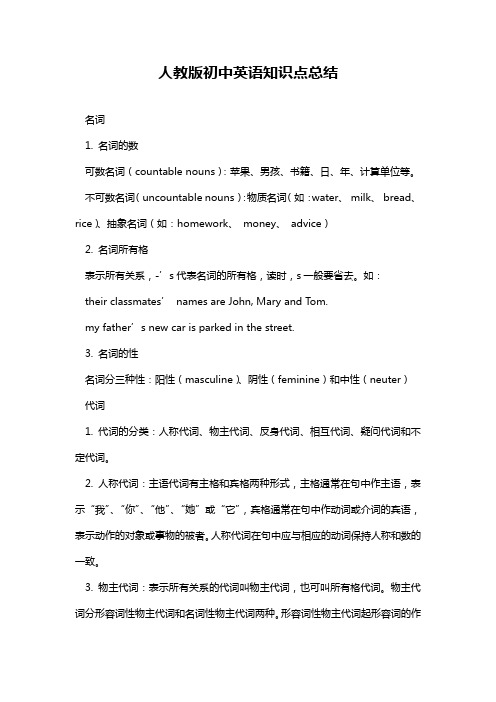
人教版初中英语知识点总结名词1. 名词的数可数名词(countable nouns):苹果、男孩、书籍、日、年、计算单位等。
不可数名词(uncountable nouns):物质名词(如:water、milk、bread、rice)、抽象名词(如:homework、money、advice)2. 名词所有格表示所有关系,-’s代表名词的所有格,读时,s一般要省去。
如:their classmates’names are John, Mary and Tom.my father’s new car is parked in the street.3. 名词的性名词分三种性:阳性(masculine)、阴性(feminine)和中性(neuter)代词1. 代词的分类:人称代词、物主代词、反身代词、相互代词、疑问代词和不定代词。
2. 人称代词:主语代词有主格和宾格两种形式,主格通常在句中作主语,表示“我”、“你”、“他”、“她”或“它”,宾格通常在句中作动词或介词的宾语,表示动作的对象或事物的被者。
人称代词在句中应与相应的动词保持人称和数的一致。
3. 物主代词:表示所有关系的代词叫物主代词,也可叫所有格代词。
物主代词分形容词性物主代词和名词性物主代词两种。
形容词性物主代词起形容词的作用,在句中作定语。
名词性物主代词起名词的作用,在句中作主语或宾语。
4. 反身代词:反身代词表示句子的宾语是句子的动作对象,它是对宾语的同级修饰,表示动作是由自己完成。
反身代词本身有词义,但不能单独使用,必须与句中的某个或某部分构成复合关系。
反身代词的构成分为两部分:前一部分用原形动词,后一部分加-self或-selves(反身代词不可与冠词连用)。
5. 相互代词:只有you和each other/one another两个词。
在句中起形容词的作用,表示相互间的关系。
6. 疑问代词:what、which、who、whose、whom。
人教七年级英语单元知识点
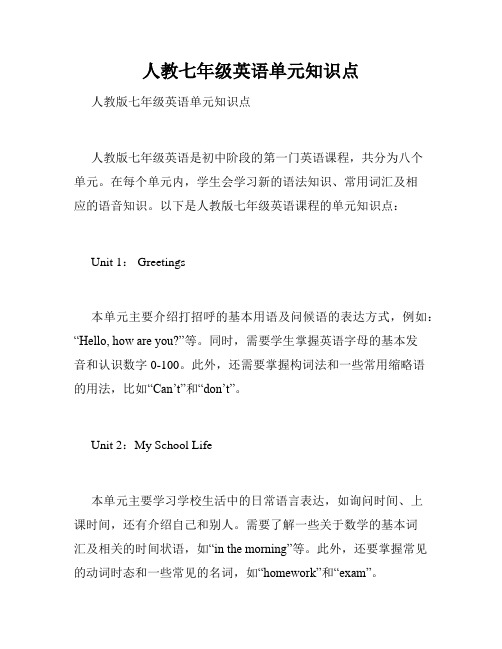
人教七年级英语单元知识点人教版七年级英语单元知识点人教版七年级英语是初中阶段的第一门英语课程,共分为八个单元。
在每个单元内,学生会学习新的语法知识、常用词汇及相应的语音知识。
以下是人教版七年级英语课程的单元知识点:Unit 1: Greetings本单元主要介绍打招呼的基本用语及问候语的表达方式,例如:“Hello, how are you?”等。
同时,需要学生掌握英语字母的基本发音和认识数字 0-100。
此外,还需要掌握构词法和一些常用缩略语的用法,比如“Can’t”和“don’t”。
Unit 2:My School Life本单元主要学习学校生活中的日常语言表达,如询问时间、上课时间,还有介绍自己和别人。
需要了解一些关于数学的基本词汇及相关的时间状语,如“in the morning”等。
此外,还要掌握常见的动词时态和一些常见的名词,如“homework”和“exam”。
Unit 3:Hobbies在本单元中,学生需要学习谈论自己的爱好,如喜欢做什么运动、看什么电影等。
同时,还需要学习一些形容词,如“interesting”和“boring”,以及一些常见的名词和动词,如“swimming”和“playing”.Unit 4:Our World本单元介绍地球的自然现象、环境保护和旅游等内容。
需要掌握一些关于自然的基本词汇,如“river”和“mountain”,掌握描述天气的基本语言,如“It’s sunny”,并了解如何表达自己想去某个城市的意愿,如“Let’s go to Beijing”。
Unit 5:Food and Drinks在本单元学生将学习如何介绍食物和饮料,如“Do you like chicken?”等。
需要掌握不同食物的名称和比喻,如“chicken wings”和“Chinese tea”。
同时还需要了解不同文化中对待食物的不同习惯,如不同国家的餐桌礼仪等。
Unit 6:Family and Friends本单元介绍家人与朋友之间的基本关系及如何介绍自己的家庭成员。
- 1、下载文档前请自行甄别文档内容的完整性,平台不提供额外的编辑、内容补充、找答案等附加服务。
- 2、"仅部分预览"的文档,不可在线预览部分如存在完整性等问题,可反馈申请退款(可完整预览的文档不适用该条件!)。
- 3、如文档侵犯您的权益,请联系客服反馈,我们会尽快为您处理(人工客服工作时间:9:00-18:30)。
初中英语人教版知识点总结一般现在时的用法1) 经常性或习惯性的动作,常与表示频腮度的时间状语连用。
时间状语:every…, sometimes, at…, on SundayI leave home for school at 7 every morning.2) 客观真理,客观存在,科学事实。
The earth moves around the sun.Shanghai lies in the east of China.3) 表示格言或警句中。
Pride goes before a fall. 骄者必败。
注意:此用法如果出现在宾语从句中,即使主句是过去时,从句谓语也要用一般现在时。
例:Columbus proved that the earth is round..4) 现在时刻的状态、能力、性格、个性。
I don’t want so much.Ann Wang writes good English but does not speak well.比较:Now I put the sugar in the cup.I am doing my homework now.第一句用一般现在时,用于操作演示或指导说明的示范性动作,表示言行的瞬间动作。
再如:Now watch me, I switch on the current and stand back. 第二句中的now是进行时的标志,表示正在进行的动作的客观状况,所以后句用一般现在时。
2. 一般过去时的用法1)在确定的过去时间里所发生的动作或存在的状态。
时间状语有:yesterday, last week, an hour ago, the other day, in 1982等。
Where did you go just now?2)表示在过去一段时间内,经常性或习惯性的动作。
When I was a child, I often played football in the street.Whenever the Browns went during their visit, they were given a warm welcome.3)句型:It is time for sb. to do sth "到……时间了" "该……了"It is time sb. did sth. "时间已迟了" "早该……了"It is time for you to go to bed. 你该睡觉了。
It is time you went to bed. 你早该睡觉了。
would (had) rather sb. did sth. 表示’宁愿某人做某事’I’d rather you came tomorrow.4) wish, wonder, think, hope 等用过去时,作试探性的询问、请求、建议等。
I thought you might have some. 我以为你想要一些。
比较:一般过去时表示的动作或状态都已成为过去,现已不复存在。
Christine was an invalid all her life.(含义:她已不在人间。
)Christine has been an invalid all her life.(含义:她现在还活着)Mrs. Darby lived in Kentucky for seven years.(含义:达比太太已不再住在肯塔基州。
)Mrs. Darby has lived in Kentucky for seven years.( 含义:现在还住在肯塔基州,有可能指刚离去)注意:用过去时表示现在,表示委婉语气。
1)动词want, hope, wonder, think, intend 等。
Did you want anything else?I wondered if you could help me.2)情态动词could, would.Could you lend me your bike?3. used to / be used toused to + do:"过去常常"表示过去习惯性的动作或状态,但如今已不存在。
Mother used not to be so forgetful.Scarf used to take a walk. (过去常常散步)be used to + doing:对……已感到习惯,或"习惯于",to是介词,后需加名词或动名词。
He is used to a vegetarian diet.Scarf is used to taking a walk.(现在习惯于散步)典型例题---- Your phone number again? I ___ quite catch it.---- It’s 69568442.A. didn’tB. couldn’tC. don’tD. can’t答案A. 本句虽没有明确的时间状语,但从语意上看出,在听的时候没有听懂这个动作发生在过去,因此应用过去时。
4. 一般将来时1) shall用于第一人称,常被will 所代替。
will 在陈述句中用于各人称,在争求意见时常用于第二人称。
Which paragraph shall I read first.Will you be at home at seven this evening?2) be going to +不定式,表示将来。
a. 主语的意图,即将做某事。
What are you going to do tomorrow?b. 计划,安排要发生的事。
The play is going to be produced next month。
c. 有迹象要发生的事Look at the dark clouds, there is going to be a storm.3) be +不定式表将来,按计划或正式安排将发生的事。
We are to discuss the report next Saturday.4) be about to +不定式,意为马上做某事。
He is about to leave for Beijing.注意:be about to 不能与tomorrow, next week 等表示明确将来时的时间状语连用。
5. be going to / will用于条件句时,be going to 表将来will 表意愿If you are going to make a journey, you’d better get ready for it a s soon as possible.Now if you will take off your clothes, we will fit the new clothes on you in front of the mirror.6. be to和be going tobe to 表示客观安排或受人指示而做某事。
be going to 表示主观的打算或计划。
I am to play football tomorrow afternoon. (客观安排)I’m going to play football tomorrow afternoon. (主观安排)7. 一般现在时表将来1)下列动词:come, go, arrive, leave, start, begin, return的一般现在时表将来。
这主要用来表示在时间上已确定或安排好的事情。
The train leaves at six tomorrow morning.When does the bus star? It stars in ten minutes.2)倒装句,表示动作正在进行,如:Here comes the bus. = The bus is coming.There goes the bell. = The bell is ringing.3)在时间或条件句中。
When Bill comes (不是will come), ask him to wait for me.I’ll write to you as soon as I arrive there.4)在动词hope, take care that, make sure that等后。
I hope they have a nice time next week.Make sure that the windows are closed before you leave the room.11. 用于现在完成时的句型1)It is the first / second time…. that…结构中的从句部分,用现在完成时。
It is the first time that I have visited the city.It was the third time that the boy had been late.2)This is the… that…结构,that 从句要用现在完成时.This is the best film that I’ve (ever) seen.这是我看过的最好的电影。
This is the first time (that) I’ve heard him sing. 这是我第一次听他唱歌。
典型例题(1) ---Do you know our town at all?---No, this is the first time I ___ here.A. wasB. have beenC. cameD. am coming答案B. This is the first time 后面所加从句应为现在完成时,故选B。
(2) ---Have you ____ been to our town before?---No, it’s the first time I ___ here.A. even, comeB. even, have comeC. ever, comeD. ever, have come答案D. ever意为曾经或无论何时,反意词为never,此两词常用于完成时。
This is the largest fish I have ever seen. It is / was the first time +that-clause 的句型中,从句要用完成时。
注意:非延续性动词的否定形式可以与表示延续时间的状语连用。
